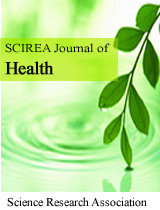Index case testing, a strategy of improving HIV positivity yield among sexual partners and biological children of Newly diagnosed HIV positive clients in Minna, Nigeria
DOI: 10.54647/pmh33158 95 Downloads 15590 Views
Author(s)
Abstract
Introduction: The Human immunodeficiency virus (HIV) Index case testing strategy involves the provision of HIV testing services (HTS) to sexual partners or family members of known HIV positive individuals (index clients). This approach was introduced in our facility in September 2019 aimed at identifying sexual partners of newly diagnosed HIV positive clients as a key intervention in identifying new HIV infection.
Objective: To assess HIV positivity yield among sexual partners and biological children of Newly diagnosed HIV positive clients.
Methodology: This is an interventional, non-controlled study, designed to assess the outcome of Index case testing in improving the detection of HIV infections. It involves the identification of sexual partners and biological children of newly diagnosed HIV positive clients (Index case). The index case is then requested to notify his or her sexual partner(s) to avail themselves for HIV testing. Any of the elicited partner that reports or contacted are offered HIV counseling and testing. Biological children of the index case are also offered HIV Testing Services (HTS). A questionnaire was used to collect data from index cases and sexual partners by health care provider on demographic and sexual characteristics of participants following their consent. Data collected was entered into SPSS version 23. Data was analyzed using both Excel and SPSS version 23.
Results: A total of 448 individuals out of the 552 elicited partners were tested, giving a percentage of those elicited that were tested (448/522) of 85.8%. out of the 448 partners that were tested 265 know their HIV status and were already on ARV medication. A total of 178 partners who never knew their HIV status were tracked and tested, and 48 tested positive, yielding a positivity rate (48/178) of 27% which was statistically significant.
Conclusion: The HIV positivity yield using Index case testing strategy among sexual partners and biological children of newly diagnosed HIV positive Clients was significant and therefore of added value as a key intervention in diagnosing new HIV infections, thereby contributing towards the attainment of the first 95% of UNAIDS target.
Keywords
Human immunodeficiency virus, HIV testing services (HTS), Index case, Sexual partners and HIV positivity yield.
Cite this paper
Chindo Ibrahim Bisallah, Onyilo Ochigbo Michael, Prince Obinna Anyanwu, Bilkisu Sulaiman,
Index case testing, a strategy of improving HIV positivity yield among sexual partners and biological children of Newly diagnosed HIV positive clients in Minna, Nigeria
, SCIREA Journal of Health.
Volume 5, Issue 3, June 2021 | PP. 45-57.
10.54647/pmh33158
References
| [ 1 ] | CDC (2018), Index case testing: a promising strategy for achieving HIV epidemic control, District health system strengthening and quality improvement for service delivery in Malawi, https://www.msh.org/sites/default/files/cdc_-_index_case_brief.pdf |
| [ 2 ] | FMOH (2016), National guidelines for HIV prevention treatment and care, https://naca.gov.ng/wp-content/uploads/2017/08/National-HIVAIDS-Prevention-and-Treatment- Guidelines_2016.pdf |
| [ 3 ] | NAIIS (2019), Nigeria HIV/AIDS Indicator and Impact Survey, National summary sheet, Preliminary findings, |
| [ 4 ] | UNAIDS ‘AIDSinfo’ (accessed August 2020) |
| [ 5 ] | NAIIS (2018), Nigeria HIV/AIDS indicator and impact survey (NAIIS) 2018 technical report |
| [ 6 ] | UNAIDS (2015), Understanding Fast-Track: accelerating action to end the AIDS epidemic by 2030 |
| [ 7 ] | Dalal S, Johnson C, Fonner V, Kennedy CE, Siegfried N, Figueroa C, et al. (2017), Improving HIV test uptake and case finding with assisted partner notification services. AIDS 31:1867–76. |
| [ 8 ] | Lin H, He N, Ding Y, Qiu D, Zhu W, Liu X, et al. (2012). Tracing sexual contacts of HIV-infected individuals in a rural prefecture, Eastern China. BMC Public Health 12 (533). |
| [ 9 ] | Broeckaert L, Haworth-Brockman M. CATIE. (2014) Available from: http://www.catie.ca/en/pif/fall-2014/you-may-have-come-contact-hiv-contact-tracing-canada.Cited 2021 January 10]. |
| [ 10 ] | Niger State Government. (2017). About Niger state: ministry of science and technology Minna, Niger state. |
| [ 11 ] | National Bureau of Statistics [NBS] (2017). Demographic statistics bulletin: National Bureau of statistics 2017 |
| [ 12 ] | UNAIDS. unaids.org. 2016 Available from: http://www.unaids.org/sites/default/ files/media_asset/2016-prevention-gap-report_en.pdf. [accessed Jan 2021]. |
| [ 13 ] | Katbi M, Adegboye A, Adedoyin A, Yunusa F, Kayode G, Bello M, Dakum P (2018), Effect of clients Strategic Index Case Testing on community-based detection of HIV infections (STRICT study), International Journal of Infectious Diseases 74 (2018) 54–6 |
| [ 14 ] | Licy Khongonyowa, Erik Schouten, and Aziz Abdallah (2018), Index case testing: a promising strategy for achieving HIV epidemic control, Malawi: district health system strengthening and quality improvement for service delivery, technical brief 2018. |
| [ 15 ] | Jubilee M, Faith Park F J, Chipango K, Pule K, Machinda A, Taruberekera N (2019), HIV index testing to improve HIV positivity rate and linkage to care and treatment of sexual partners, adolescents and children of PLHIV in Lesotho, PLoS ONE 14(3): e0212762. |
| [ 16 ] | Mwango LK et al. (2020) Index and targeted community-based testing to optimize HIV case finding and ART linkage among men in Zambia, Journal of the International AIDS Society, 23(S2):e25520, http://onlinelibrary.wiley.com/doi/10.1002/jia2.25520/full, https://doi.org/10.1002/jia2.255205123(S2):e25520 |
| [ 17 ] | A. Emeh, S.O. Usman et al (2021) Positivity yield of HIV index testing services from selected healthcare facilities in Ondo State, southwest Nigeria. African Journal of Clinical and Experimental Microbiology, Vol. 22 No. 1. https://www.ajol.info/index.php/ajcem/article/view/203073, 10.4314/ajcem. v22i1.13 |

